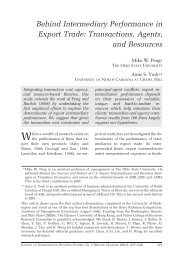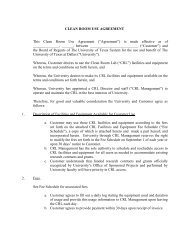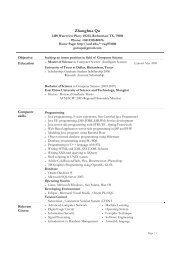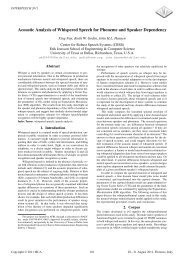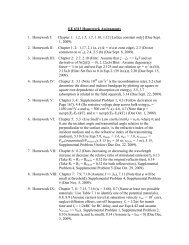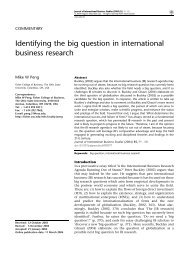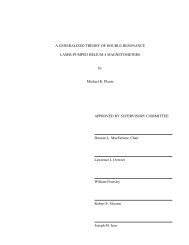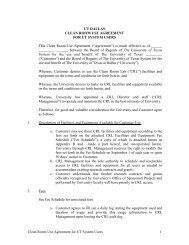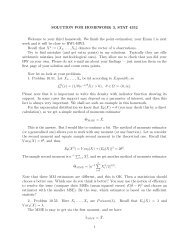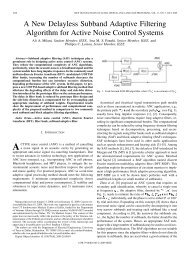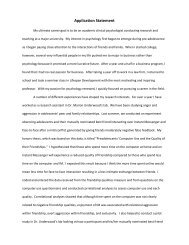DOCTORAL DEGREE (Ph - The University of Texas at Dallas
DOCTORAL DEGREE (Ph - The University of Texas at Dallas
DOCTORAL DEGREE (Ph - The University of Texas at Dallas
You also want an ePaper? Increase the reach of your titles
YUMPU automatically turns print PDFs into web optimized ePapers that Google loves.
<strong>DOCTORAL</strong> <strong>DEGREE</strong> (<strong>Ph</strong>.D.) IN PUBLIC POLICY AND POLITICAL ECONOMY<br />
(PPPE)<br />
ADVISING GUIDE<br />
2008-2009<br />
Office <strong>of</strong> the Program Director for Public Policy and Political Economy<br />
School <strong>of</strong> Economic, Political and Policy Sciences<br />
<strong>University</strong> <strong>of</strong> <strong>Texas</strong> <strong>at</strong> <strong>Dallas</strong><br />
800 W Campbell<br />
Richardson, <strong>Texas</strong> 75080<br />
<strong>Ph</strong>one: (972) 883-6406<br />
Website: http://www.utdallas.edu/epps/pppe<br />
Revision D<strong>at</strong>e: July 2009<br />
Also consult the Gradu<strong>at</strong>e C<strong>at</strong>alog<br />
Table <strong>of</strong> Content<br />
Some Preliminary Consider<strong>at</strong>ions 1<br />
<strong>The</strong> Program Director for Public Policy and Political Economy 1<br />
Admission 1<br />
Transfer Credit 2<br />
<strong>The</strong> 99-Hour-Rule and Out-<strong>of</strong>-St<strong>at</strong>e Tuition 2<br />
Grading Policy 2<br />
Student Ethics and Conduct 3<br />
Student Registr<strong>at</strong>ion 3<br />
Student Funding 3<br />
School Fellowships 4<br />
School Workshop 4<br />
Program Requirements<br />
Structure <strong>of</strong> the <strong>Ph</strong>.D. Program 4<br />
Step I: Core Courses 5<br />
Step II: Field Courses 6<br />
Step III: Area <strong>of</strong> Specializ<strong>at</strong>ion 6<br />
Step IV: Qualifying Exam and Student Portfolio 9<br />
Step V: <strong>The</strong> Dissert<strong>at</strong>ion Seminar, Committee and Proposal 10<br />
Step VI: <strong>The</strong> Dissert<strong>at</strong>ion 11<br />
Sample Schedule 12<br />
PPPE Core Faculty 13
1<br />
<strong>DOCTORAL</strong> <strong>DEGREE</strong> (<strong>Ph</strong>.D.) IN PUBLIC POLICY AND POLITICAL ECONOMY<br />
(PPPE)<br />
ECONOMIC, POLITICAL AND POLICY SCIENCES (EPPS)<br />
ADVISING GUIDE<br />
Welcome to the doctoral program in Public Policy and Political Economy (henceforth PPPE) in<br />
the School <strong>of</strong> Economic, Political and Political Sciences (henceforth EPPS) <strong>at</strong> the <strong>University</strong> <strong>of</strong><br />
<strong>Texas</strong> <strong>at</strong> <strong>Dallas</strong>. <strong>The</strong> guide suggests steps for proceeding carefully through the program and it<br />
summarizes important policies and procedures th<strong>at</strong> gradu<strong>at</strong>e students are expected to know. If<br />
you have any questions, then please contact the Program Director or the Gradu<strong>at</strong>e Program<br />
Administr<strong>at</strong>ive Assistant. We are happy to answer your questions and help you understand the<br />
process. Your successful completion <strong>of</strong> the program is our goal.<br />
Some Preliminary Consider<strong>at</strong>ions<br />
Important m<strong>at</strong>ters concerning university policies and procedures, gradu<strong>at</strong>e programs, and<br />
assistantships are contained in the <strong>University</strong> <strong>of</strong> <strong>Texas</strong> <strong>at</strong> <strong>Dallas</strong> Gradu<strong>at</strong>e Student Guide and the<br />
<strong>University</strong> <strong>of</strong> <strong>Texas</strong> <strong>at</strong> <strong>Dallas</strong> Gradu<strong>at</strong>e C<strong>at</strong>alog 2008-<strong>The</strong> Guide and C<strong>at</strong>alog are both available<br />
from the Office <strong>of</strong> the Dean <strong>of</strong> Gradu<strong>at</strong>e Studies, or on - line <strong>at</strong><br />
http://www.utdallas.edu/dept/graddean/. It is recommended th<strong>at</strong> you read both as well as this<br />
Advising Guide.<br />
To ensure the highest level <strong>of</strong> privacy and security all <strong>of</strong>ficial correspondence<br />
must be done through your UTD e-mail account. You should regularly review communic<strong>at</strong>ions<br />
sent to your UTD email account. You should keep copies <strong>of</strong> your degree plan and all documents<br />
rel<strong>at</strong>ed to transfer work and/or substitutions.<br />
<strong>The</strong> PPPE Program Director<br />
<strong>The</strong> PPPE Program Director is a faculty member who works with the program faculty and<br />
<strong>University</strong> administr<strong>at</strong>ion to administer the program. <strong>The</strong> Program Director, in conjunction with<br />
the PPPE Program Committee and the program faculty, is responsible for course scheduling,<br />
gradu<strong>at</strong>e program development and administr<strong>at</strong>ion, admissions decisions, teaching/research<br />
assistantships and doctoral student recruitment, advising and pr<strong>of</strong>essional development. You<br />
should address questions about the doctoral program and your progress in it to the Program<br />
Director. <strong>The</strong> Program Director is here to help you and guide you through the process.<br />
Admission<br />
<strong>The</strong>re are different types <strong>of</strong> admission into the PPPE program. Admission means th<strong>at</strong> a<br />
prospective student has met all admission requirements and may proceed with coursework in the<br />
doctoral program. Conditional admission means th<strong>at</strong> an individual has not met one or more<br />
requirements, such as a letter <strong>of</strong> recommend<strong>at</strong>ion or a s<strong>at</strong>isfactory score on the Gradu<strong>at</strong>e Record<br />
Examin<strong>at</strong>ion (GRE) or Gradu<strong>at</strong>e Management Aptitude Test (GMAT). Such students typically<br />
can begin coursework in the program, but they must fulfill these requirements within the time<br />
period specified in their letter <strong>of</strong> admission. If the conditions <strong>of</strong> admission are not met<br />
August 2009
2<br />
continu<strong>at</strong>ion in the program is not allowed.<br />
Transfer Credit<br />
Students who have taken gradu<strong>at</strong>e courses in another program may transfer these courses after<br />
they have been enrolled for nine credit hours in the doctoral program. Courses which received a<br />
grade <strong>of</strong> “B” or better may be transferred. Also, students may transfer up to one-half (45 hours)<br />
<strong>of</strong> the required hours for a doctoral degree from another university. This may consist <strong>of</strong> up to 36<br />
semester hours or equivalent <strong>of</strong> masters’ credit and 9 hours <strong>of</strong> doctoral credit. Up to thirty six<br />
hours <strong>of</strong> masters degree work may be transferred toward the PPPE degree. If a course taken<br />
elsewhere is similar to one required for a qualifying examin<strong>at</strong>ion in the doctoral program here,<br />
then the student may be asked to consult with the appropri<strong>at</strong>e pr<strong>of</strong>essor in order to determine<br />
whether the course taken elsewhere adequ<strong>at</strong>ely covers the coursework required here. In most<br />
cases, students are advised to take the required PPPE courses so th<strong>at</strong> they are prepared.<br />
All students who are interested in transferring courses must meet with the Program Director and<br />
they must complete a “Request for Transfer Credit” form. <strong>The</strong> form is available in the Gradu<strong>at</strong>e<br />
Program Office. <strong>The</strong> completed form, syllabi, and a transcript are forwarded for the approval <strong>of</strong><br />
the Dean <strong>of</strong> Gradu<strong>at</strong>e Studies. If approved, then the courses appear as transfer credits on the<br />
student's record.<br />
<strong>The</strong> 99-Hour Rule and Out-<strong>of</strong>-St<strong>at</strong>e Tuition<br />
Legisl<strong>at</strong>ive mand<strong>at</strong>es require th<strong>at</strong> a student who has <strong>at</strong>tained more than 99 doctoral hours will be<br />
subject to out-<strong>of</strong>-st<strong>at</strong>e tuition r<strong>at</strong>es. Attempted hours are defined by the c<strong>at</strong>alog as any courses<br />
including those completed, failed or from which the student withdrew after census day. This also<br />
includes all doctoral hours <strong>at</strong>tempted in any <strong>Texas</strong> institution <strong>of</strong> higher learning. Note, however,<br />
th<strong>at</strong> “<strong>Ph</strong>.D. hours” begins only after a student has acquired 30 hours, or if they enter a <strong>Ph</strong>.D.<br />
program with a pre-existing Master’s degree.<br />
Grading Policy<br />
Students are expected to maintain <strong>at</strong> least a 3.0 grade point average in the program. Students<br />
who do not must raise their grade point average to <strong>at</strong> least 3.0 during the next two semesters <strong>of</strong><br />
registr<strong>at</strong>ion. Failure to do so results in immedi<strong>at</strong>e dismissal. Also students with more than two<br />
consecutive semesters <strong>of</strong> a GPA below 3.0 will be subject to review and dismissal from the<br />
program. Students must consult with the Program Head when they consider the possibility <strong>of</strong><br />
retaking a course. In many cases, retaking courses is not allowed. Please note th<strong>at</strong> courses<br />
retaken count towards the “99 hour” rule.<br />
An Incomplete is granted when the student has finished close to 70% <strong>of</strong> the course requirements<br />
and can document legitim<strong>at</strong>e reasons, such as illness, which prevent completion <strong>of</strong> the remaining<br />
requirements before the end <strong>of</strong> the semester. Pr<strong>of</strong>essors may have other requirements for<br />
granting an Incomplete. A “Request for Incomplete” form is available in the Gradu<strong>at</strong>e Program<br />
Office. All remaining requirements must be finished and the pr<strong>of</strong>essor must submit the “Change<br />
<strong>of</strong> Grade” form by the deadline <strong>of</strong> eight weeks from the first day <strong>of</strong> the subsequent long<br />
August 2009
3<br />
semester.<br />
Student Ethics and Conduct<br />
Student behavior is expected to conform to the highest academic and pr<strong>of</strong>essional standards. In<br />
particular, fraudulent behavior, including che<strong>at</strong>ing and plagiarism, is not toler<strong>at</strong>ed.<br />
Students are expected to maintain continuous registr<strong>at</strong>ion (excluding summer) <strong>of</strong> <strong>at</strong> least three<br />
semester credit hours in the <strong>Ph</strong>.D. program. Such registr<strong>at</strong>ion includes, but is not limited to,<br />
semesters in which examin<strong>at</strong>ions are taken and the semester <strong>of</strong> gradu<strong>at</strong>ion. A student who does<br />
not maintain registr<strong>at</strong>ion and has not requested and received permission for a leave <strong>of</strong> absence,<br />
must apply for readmission. All requests for leave <strong>of</strong> absence must be sent to the Program<br />
Director, who will forward the request to the Dean <strong>of</strong> Gradu<strong>at</strong>e Studies. <strong>The</strong> student is subject to<br />
the<br />
Student Registr<strong>at</strong>ion<br />
Gradu<strong>at</strong>e C<strong>at</strong>alog in effect <strong>at</strong> the time <strong>of</strong> readmission. Since the C<strong>at</strong>alog<br />
is revised<br />
biennially, students taking leaves may be required to s<strong>at</strong>isfy different degree requirements than<br />
were in effect prior to their leave. And, thus may need additional time to complete the program.<br />
Students on financial aid should consult the Office <strong>of</strong> Financial Aid on minimum hours <strong>of</strong><br />
registr<strong>at</strong>ion to maintain eligibility.<br />
<strong>The</strong> standard (and minimum) course load for a full-time gradu<strong>at</strong>e student during the fall or spring<br />
semester is 9 hours. <strong>The</strong> maximum is 15 hours, although it is rare for students to be able to<br />
successfully manage this workload. Students who have work, family, or other nonacademic<br />
oblig<strong>at</strong>ions should consult with the Program Director on str<strong>at</strong>egies for fulfilling program<br />
requirements.<br />
Student Funding<br />
Full-time PPPE students may qualify for funding through appointment as a gradu<strong>at</strong>e Teaching<br />
Assistant (TA). Teaching Assistantships carry with them the expect<strong>at</strong>ion <strong>of</strong> 20 hours <strong>of</strong> work per<br />
week with a faculty supervisor or School center or program. Assistantships for students entering<br />
the program will receive stipends <strong>of</strong> $1200. <strong>The</strong>se stipends are adjusted upon each year up to<br />
$1400, not including periodic cost <strong>of</strong> living increases. TAs are also eligible for a gradu<strong>at</strong>e tuition<br />
scholarship th<strong>at</strong> covers 9 hours per semester <strong>of</strong> tuition and fee costs. Subject to budget<br />
availability and s<strong>at</strong>isfactory performance, TAs may be eligible for funding in the summer<br />
semester. <strong>The</strong> minimum hour registr<strong>at</strong>ion requirements may vary year to year, so students<br />
should check with the PPPE Program Director prior to registering for summer. Qualified<br />
students may also be employed as Teaching Associ<strong>at</strong>es, with responsibility for teaching their<br />
own courses. This can be an invaluable experience for those who seek a career in teaching.<br />
In addition to TA positions, students with particular skills may be appointed as gradu<strong>at</strong>e<br />
Research Assistant (RAs). RA positions differ from TA positions in th<strong>at</strong> they are funded by<br />
external faculty grants and contracts, which mean th<strong>at</strong> RA appointments are expected to work on<br />
those funded projects. Monthly compens<strong>at</strong>ion may vary from th<strong>at</strong> <strong>of</strong> the TA, based upon the<br />
conditions <strong>of</strong> the grant, contract, etc. Full time (20 hours per week) RAs are generally eligible<br />
for the same benefits, including tuition waivers.<br />
August 2009
4<br />
TAs will be funded so long as they: (1) maintain acceptable academic progress (maintaining a<br />
3.0 or above GPA) and perform their responsibilities in an acceptable, timely manner; (2) do not<br />
exceed 10 long semesters <strong>of</strong> funding or 99 semester hours <strong>of</strong> <strong>Ph</strong>.D. work, whichever the student<br />
achieves first; and (3) funding is available. RA funding is contingent on the continu<strong>at</strong>ion <strong>of</strong><br />
external funding.<br />
School Fellowships<br />
<strong>The</strong> School <strong>of</strong> Economic, Political and Policy Sciences <strong>of</strong>fers the Vibhooti Shukla and Kim Heja<br />
Fellowships each year. <strong>The</strong> Shukla Fellowship is named for Pr<strong>of</strong>essor Vibhooti Shukla who died<br />
in 1992 and is available to any student, or prospective student, eligible for a research or teaching<br />
assistantship. <strong>The</strong> Shukla Fellowship has a preference for students pursuing research in<br />
development and provides $1,000 per year for up to four years. <strong>The</strong> Fellow is also eligible for a<br />
teaching assistantship and gradu<strong>at</strong>e scholarship, the total value <strong>of</strong> which exceeds $18,000.<br />
School Workshop<br />
<strong>The</strong> School <strong>of</strong> Economic, Political and Policy Sciences <strong>of</strong>fers various workshops and<br />
present<strong>at</strong>ions to give students exposure to ongoing faculty and gradu<strong>at</strong>e student research. This<br />
includes the PPPE Workshop, which is scheduled periodically over the course <strong>of</strong> the academic<br />
year. All <strong>Ph</strong>.D. students in Public Policy and Political Economy are strongly encouraged to<br />
<strong>at</strong>tend the Workshop; additionally, TAs and RAs are expected to <strong>at</strong>tend on a regular basis.<br />
Announcements will be made <strong>at</strong> least a week ahead <strong>of</strong> time.<br />
<strong>The</strong> Structure <strong>of</strong> the <strong>Ph</strong>.D. Program in PPPE<br />
<strong>The</strong> <strong>Ph</strong>.D. program in PPPE consists <strong>of</strong> the following:<br />
• 33 hours <strong>of</strong> core courses<br />
• 12 hours <strong>of</strong> field courses<br />
• 6 hours area <strong>of</strong> specializ<strong>at</strong>ion<br />
• A qualifying examin<strong>at</strong>ion in Quantit<strong>at</strong>ive Empirical Methods and Research Design<br />
• Portfolio submitted and approved by Portfolio Committee<br />
• M<strong>at</strong>ricul<strong>at</strong>ion to the dissert<strong>at</strong>ion phase<br />
• Particip<strong>at</strong>ion in Dissert<strong>at</strong>ion Seminar<br />
• Successful completion <strong>of</strong> a dissert<strong>at</strong>ion<br />
August 2009
5<br />
I. Core Courses – 33 hours (Course descriptions are available on-line in the Gradu<strong>at</strong>e<br />
C<strong>at</strong>alog. Recent course syllabi are available on-line <strong>at</strong> http://sacs.utdallas.edu/syllabi/)<br />
Students complete a core sequence <strong>of</strong> courses as follows:<br />
1. Six hours <strong>of</strong> coursework in Government and Public Policy:<br />
POEC 5303 Public Policymaking and Institutions<br />
POEC 5308 Ethics, Culture and Responsibility<br />
2. Six hours <strong>of</strong> <strong>The</strong>ories <strong>of</strong> Political Economy<br />
POEC 5307 Economics for Public Policy<br />
POEC 6312 Social Economic <strong>The</strong>ories<br />
3. Fifteen hours <strong>of</strong> Empirical Methods<br />
POEC 5313 Descriptive and Inferential St<strong>at</strong>istics<br />
POEC 5316 Advanced Regression Analysis for the Economic, Political and Policy Sciences<br />
Students will also take <strong>at</strong> least three additional courses from a set approved by the relevant<br />
gradu<strong>at</strong>e program committee. (See Table below)<br />
METHODS electives<br />
POEC 6304 Advanced Analytic Techniques<br />
POEC 6318 Structural Equ<strong>at</strong>ion and Multilevel (Hierarchical) Modeling<br />
POEC 6344 C<strong>at</strong>egorical and Limited Dependent Variables<br />
POEC 6345 Survey Research<br />
POEC 6346 Qualit<strong>at</strong>ive Research Methods<br />
POEC 6352 Evalu<strong>at</strong>ion Research Methods in the Economic, Political and Policy<br />
Sciences<br />
POEC 6V91 Evalu<strong>at</strong>ion Research<br />
POEC 7359 Special Topics in Policy Methods<br />
POEC 7368 Sp<strong>at</strong>ial Epidemiology<br />
POEC 7370 Time Series Analysis<br />
POEC 7380 Applied Multivari<strong>at</strong>e Analysis<br />
4. Six hours <strong>of</strong> Research Design<br />
POEC 5310 Research Design I<br />
POEC 6342 Research Design II<br />
August 2009
6<br />
II. Field Courses<br />
Field courses consist <strong>of</strong> 12 hours <strong>of</strong> course work taken in any two <strong>of</strong> four defined policy areas.<br />
Students must take six hours <strong>of</strong> required courses in each <strong>of</strong> the fields. <strong>The</strong> fields students may<br />
select from and the required courses are provided below, although appropri<strong>at</strong>e substitutions are<br />
permitted with permission <strong>of</strong> the PPPE Program Director. Course syllabi are available on-line <strong>at</strong><br />
http://sacs.utdallas.edu/syllabi/.<br />
Criminology<br />
CRIM 6311 Crime and Justice Policy<br />
CRIM 6305 Law and Social Control<br />
Development<br />
POEC 6354 <strong>The</strong>ories and Issues <strong>of</strong> Development (Required), and:<br />
Select one <strong>of</strong> the following:<br />
POEC 6364 Development Economics<br />
POEC 6360 World Political Economy<br />
POEC 6362 Political Development<br />
POEC 6318 Popul<strong>at</strong>ion and Development<br />
Intern<strong>at</strong>ional Political Economy (Select two <strong>of</strong> the following):<br />
POEC 6360 World Political Economy<br />
PSCI 5301 Proseminar in Democr<strong>at</strong>iz<strong>at</strong>ion, Globaliz<strong>at</strong>ion and Intern<strong>at</strong>ional Rel<strong>at</strong>ions<br />
PSCI 6309 Intern<strong>at</strong>ional Political Economy and Organiz<strong>at</strong>ion<br />
Social Policy<br />
SOC 6350 Social Str<strong>at</strong>ific<strong>at</strong>ion<br />
POEC 7340 Domestic Social Policy<br />
*Note: (1) Students may only count POEC 6360 World Political Economy as a field course for<br />
either Development or Intern<strong>at</strong>ional Political Economy, not for both.<br />
III. Area <strong>of</strong> Specializ<strong>at</strong>ion<br />
Each student must choose one <strong>of</strong> the fields they have selected as their area <strong>of</strong> specializ<strong>at</strong>ion.<br />
This requires a minimum <strong>of</strong> six additional hours <strong>of</strong> coursework. Students are expected to write<br />
their dissert<strong>at</strong>ions in the area they select as their specializ<strong>at</strong>ion, although exceptions are possible<br />
with approval <strong>of</strong> the PPPE Program Director. See approved list <strong>of</strong> courses for the possible<br />
concentr<strong>at</strong>ions below. Other courses may be added with the approval <strong>of</strong> the PPPE Program<br />
Director.<br />
August 2009
7<br />
Courses approved for Areas <strong>of</strong> Specializ<strong>at</strong>ion<br />
Note: each course can only be used to s<strong>at</strong>isfy one c<strong>at</strong>egory<br />
Criminology<br />
POEC 5356 Pre-emptive Str<strong>at</strong>egies and Tactics<br />
POEC 5357 Inform<strong>at</strong>ion Sharing and Communic<strong>at</strong>ion<br />
POEC 5358 Social Networks and Intelligence Led Policing<br />
POEC 5359 Protecting Critical Resources and Infrastructure<br />
POEC 7300 Advances in Criminology <strong>The</strong>ory<br />
POEC 7301 Seminar in Criminology Research<br />
Development<br />
POEC 6309 Intern<strong>at</strong>ional Political Economy and Organiz<strong>at</strong>ions<br />
POEC 6335 Institutions and Development<br />
POEC 6341 Urban Development<br />
POEC 6360 World Political Economy<br />
POEC 6362 Political Development<br />
POEC 6363 Conflict and Development<br />
POEC 6364 Development Economics<br />
POEC 6368 Popul<strong>at</strong>ion and Development<br />
POEC 6379 Special Topics in Development Studies<br />
POEC 6V76 Policy Research Workshop in Development Studies<br />
POEC 7368 Sp<strong>at</strong>ial Epidemiology<br />
POEC 7V64 Policy Research Workshop in Poverty Research and Policy<br />
POEC/PSCI Political Economy <strong>of</strong> MNCs<br />
6319<br />
PSCI 5301 Proseminar in Democr<strong>at</strong>iz<strong>at</strong>ion, Globaliz<strong>at</strong>ion and Intern<strong>at</strong>ional<br />
Rel<strong>at</strong>ions<br />
PSCI 6337 Compar<strong>at</strong>ive Institutions<br />
Intern<strong>at</strong>ional Conflict & Security<br />
POEC 5355 Introduction to Homeland Security<br />
POEC 5356 Pre-emptive Str<strong>at</strong>egies and Tactics<br />
POEC 5357 Inform<strong>at</strong>ion Sharing and Communic<strong>at</strong>ion<br />
POEC 5358 Social Networks and Intelligence Led Policing<br />
POEC 5359 Protecting Critical Resources and Infrastructure<br />
POEC 6361 Political Violence and Terrorism<br />
POEC 6363 Conflict and Development<br />
POEC 6367 Topical Issues in Conflict and Conflict Resolution<br />
POEC 6369 N<strong>at</strong>ional and Intern<strong>at</strong>ional Security Str<strong>at</strong>egies and Policies<br />
POEC 7320 Intern<strong>at</strong>ional Negoti<strong>at</strong>ions<br />
PSCI 7381/ PA Intern<strong>at</strong>ional Conflict Resolution<br />
5319<br />
August 2009
8<br />
Intern<strong>at</strong>ional Political Economy<br />
POEC 6301 Political-Economic <strong>The</strong>ories<br />
POEC 6335 Institutions and Development<br />
POEC 6360 World Political Economy<br />
POEC 6366 Intern<strong>at</strong>ional Economics<br />
POEC 6V81 Special Topics in Political Economy<br />
POEC 7320 Intern<strong>at</strong>ional Negoti<strong>at</strong>ions<br />
POEC 7368 Sp<strong>at</strong>ial Epidemiology<br />
POEC 7V64 Policy Research Workshop in Poverty Research and Policy<br />
POEC 6319 Political Economy <strong>of</strong> MNCs<br />
PSCI 5301 Proseminar in Democr<strong>at</strong>iz<strong>at</strong>ion, Globaliz<strong>at</strong>ion, & Int'l Rel<strong>at</strong>ions<br />
PSCI 6309 Intern<strong>at</strong>ional Political Economy and Organiz<strong>at</strong>ion<br />
Social Policy<br />
POEC 5371 Non-Pr<strong>of</strong>it Organiz<strong>at</strong>ions<br />
POEC 5372 Non-Pr<strong>of</strong>it Management and Leadership<br />
POEC 6350 Social Str<strong>at</strong>ific<strong>at</strong>ion<br />
POEC 6374 Financial Management for Non-pr<strong>of</strong>it Organiz<strong>at</strong>ions<br />
POEC 6375 History and <strong>The</strong>ories <strong>of</strong> the American <strong>Ph</strong>ilanthropic Sector<br />
POEC 6376 Assessment and Outcomes for Non-pr<strong>of</strong>it Organiz<strong>at</strong>ions<br />
POEC 7340 Domestic Social Policy<br />
POEC 7341 Health Policy<br />
POEC 7344 Gender and Public Policy<br />
POEC 7368 Sp<strong>at</strong>ial Epidemiology<br />
POEC 7376 Special Topics in Social Policy<br />
POEC 7V47 Policy Research Workshop in Health Care Policy<br />
POEC 7V62 Policy Research Workshop in Social Policy<br />
Courses th<strong>at</strong> can be used as Electives<br />
POEC 6320 Organiz<strong>at</strong>ional <strong>The</strong>ory<br />
POEC 6331 Executives, Legisl<strong>at</strong>ures, and Public Policy<br />
POEC 6353 Industry, Technology, and Science Policy<br />
POEC 7304 Cost-Benefit Analysis<br />
POEC 7319 Economics <strong>of</strong> Educ<strong>at</strong>ion<br />
POEC 7321 Seminar on Business and Government<br />
POEC 7323 Economic Regul<strong>at</strong>ion <strong>of</strong> Business<br />
POEC 7327 Innov<strong>at</strong>ion Dynamics and Economic Change<br />
POEC 7329 Special Topics in Industry and Public Policy<br />
POEC 7330 Special Topics in Institutions and Processes<br />
POEC 7V20 Workshop in Teaching Effectiveness<br />
POEC 7V26 Policy Research Workshop in Institutions and Processes<br />
POEC8V01 Independent Study<br />
POEC8V97 Internship<br />
August 2009
9<br />
IV. Qualifying Examin<strong>at</strong>ion and Student Portfolio<br />
A. After the end <strong>of</strong> their first year, full-time students will be evalu<strong>at</strong>ed on the basis <strong>of</strong> a<br />
Methods Qualifying Examin<strong>at</strong>ion (MQE) and a portfolio <strong>of</strong> papers from their core and field<br />
courses. <strong>The</strong> MQE is typically scheduled for April or early May. <strong>The</strong> portfolio will be<br />
due, depending upon individual circumstances rel<strong>at</strong>ing to completion <strong>of</strong> coursework, in l<strong>at</strong>e<br />
Summer/early fall or early spring <strong>of</strong> the second year. Part-time students would submit their<br />
portfolios <strong>at</strong> the equivalent point in their third year.<br />
<strong>The</strong> MQE will cover course m<strong>at</strong>erial from POEC 5313 Descriptive and Inferential<br />
St<strong>at</strong>istics, POEC 5316 Advanced Regression Analysis, POEC 5310 Research Design I and<br />
POEC 6342 Research Design II. It is critical full-time students take POEC 5313 and<br />
POEC 5310 the fall semester <strong>of</strong> the first year and POEC 5316 and POEC 6342 in spring.<br />
<strong>The</strong> Exam is administered once a year in l<strong>at</strong>e April or May. Student performance will be<br />
evalu<strong>at</strong>ed as uns<strong>at</strong>isfactory, s<strong>at</strong>isfactory or excellent. Those failing the exam will be given<br />
a second opportunity to pass, <strong>at</strong> the beginning <strong>of</strong> the subsequent fall semester. Those failing<br />
the MQE for the second time will not be allowed to continue the program. Part-time<br />
students should seek to complete the required methods sequence by spring <strong>of</strong> their second<br />
year; courses noted above should be taken in the same basic sequence. Further inform<strong>at</strong>ion<br />
on the MQE may be obtained from the chair <strong>of</strong> the PPPE Methods Committee.<br />
Inform<strong>at</strong>ion about the Exam will be dissemin<strong>at</strong>ed to all students early in spring semester.<br />
B. <strong>The</strong> final student paper portfolio will consist <strong>of</strong> a series <strong>of</strong> papers th<strong>at</strong> contain the following<br />
elements:<br />
1. a liter<strong>at</strong>ure review normally written in field survey courses<br />
2. an empirical analysis written in core methods courses<br />
3. a research design<br />
<strong>The</strong> portfolio committee will review each student’s portfolio to determine if it is<br />
s<strong>at</strong>isfactory and if the student is prepared to write a dissert<strong>at</strong>ion. Some students may<br />
be required to take remedial work and to resubmit portions <strong>of</strong> their portfolio. If the<br />
faculty committee ultim<strong>at</strong>ely deems the student is not prepared to write a dissert<strong>at</strong>ion,<br />
the student will be design<strong>at</strong>ed as Masters Level and allowed to continue to complete<br />
an appropri<strong>at</strong>e Masters degree.<br />
<strong>The</strong> liter<strong>at</strong>ure review requirement may be met in two ways, including a) an extensive<br />
(stand alone) liter<strong>at</strong>ure survey <strong>of</strong> the extant research on a research question <strong>of</strong><br />
demonstr<strong>at</strong>ed importance, or (b) the incorpor<strong>at</strong>ion <strong>of</strong> a substantial liter<strong>at</strong>ure review as<br />
part <strong>of</strong> a larger research project th<strong>at</strong> could include, but not be limited to, an empirical<br />
quantit<strong>at</strong>ive analysis. Portfolio submission requirements may be met by papers<br />
submitted in appropri<strong>at</strong>e core or field courses or POEC 6V81 Topics: Social Science<br />
Inquiry.<br />
<strong>The</strong> portfolio requirement concerning empirical and methodological papers and a<br />
research design project may be completed as follows:<br />
August 2009
10<br />
Concerning the requirement <strong>of</strong> an empirical paper, students will be given the opportunity<br />
to submit papers th<strong>at</strong> will have been completed as a normal part <strong>of</strong> the following<br />
courses:<br />
1. POEC 5316 Advanced Regression Analysis for the Economic, Political, and Policy<br />
Sciences<br />
2. POEC 6318 Structural Equ<strong>at</strong>ion and Multilevel (Hierarchical) Modeling<br />
3. POEC 6344 C<strong>at</strong>egorical and Limited Dependent Variables<br />
4. POEC 7370 Time Series Analysis<br />
5. GISC 6382 Applied Geographic Inform<strong>at</strong>ion Systems<br />
6. GISC 6384 Sp<strong>at</strong>ial Analysis and Modeling<br />
Work from other PPPE courses may be substituted with permission <strong>of</strong> the chair <strong>of</strong> the<br />
Portfolio Committee.<br />
Second, regarding the research design project, students have <strong>at</strong> least two<br />
opportunities to develop such a paper for portfolio submission. <strong>The</strong> following<br />
courses include a design paper th<strong>at</strong> would be suitable for submission to meet this<br />
portfolio requirement:<br />
1. POEC 6342 Research Design II<br />
2. POEC 6352 Evalu<strong>at</strong>ion Research Methods<br />
In addition to these two courses which routinely require students to develop research<br />
design papers which can be submitted to meet portfolio requirements, there may also<br />
be similar opportunities to develop a research design paper as part <strong>of</strong> the following<br />
classes:<br />
1. POEC 5310 Research Design I<br />
2. POEC 6340 Qualit<strong>at</strong>ive Criminology<br />
3. POEC 6345 Survey Research<br />
4. POEC 6346 Qualit<strong>at</strong>ive Research Methods<br />
Again, work from other appropri<strong>at</strong>e PPPE gradu<strong>at</strong>e courses may be substituted with<br />
permission <strong>of</strong> the chair <strong>of</strong> the Portfolio Committee. Inform<strong>at</strong>ion about the portfolio<br />
and its requirements will be announced early in the spring semester.<br />
V. <strong>The</strong> Dissert<strong>at</strong>ion Seminar, Dissert<strong>at</strong>ion Committee and Proposal<br />
<strong>The</strong> Dissert<strong>at</strong>ion Seminar is designed to assist students in the formul<strong>at</strong>ion <strong>of</strong> a dissert<strong>at</strong>ion<br />
topic and, in conjunction with a student’s Dissert<strong>at</strong>ion Advisor, the dissert<strong>at</strong>ion proposal.<br />
Students who have completed their Qualifying Exam and portfolio must register for one<br />
semester <strong>of</strong> Dissert<strong>at</strong>ion Seminar.<br />
At some point after the Qualifying Exam has been completed and the portfolio has been<br />
approved, a student will determine (following convers<strong>at</strong>ions with relevant faculty, the<br />
Dissert<strong>at</strong>ion Seminar instructor and the Program Director) a likely dissert<strong>at</strong>ion supervisor<br />
to chair the student’s Dissert<strong>at</strong>ion Committee. When a faculty member agrees to chair the<br />
dissert<strong>at</strong>ion Supervising Committee, the member and the student decide the remaining<br />
composition <strong>of</strong> the Supervising Committee. A minimum <strong>of</strong> four “voting members”<br />
August 2009
11<br />
(tenured/tenure-track) <strong>of</strong> the faculty is normally required. Additional members from<br />
outside the voting faculty must be approved by the Program Director and Dean <strong>of</strong> the<br />
Gradu<strong>at</strong>e Studies. When all members have agreed informally to serve, the Program<br />
Director approves and appoints the committee.<br />
<strong>The</strong> dissert<strong>at</strong>ion proposal briefly describes the topic; the background <strong>of</strong> the research; the<br />
hypotheses to be tested or concepts to be explored; and the methodology to be employed.<br />
<strong>The</strong> proposal should address the rel<strong>at</strong>ionship <strong>of</strong> the proposed work to existing work in the<br />
field, its intended outcome, and its contribution to the field. <strong>The</strong> proposal should be<br />
prepared by the student in consult<strong>at</strong>ion with the supervising pr<strong>of</strong>essor who will approve the<br />
document before its submission to the dissert<strong>at</strong>ion committee. <strong>The</strong> recommend<strong>at</strong>ion <strong>of</strong> the<br />
committee is then forwarded to the Program Director and the Dean <strong>of</strong> Gradu<strong>at</strong>e Studies for<br />
approval. When the student, the chair and the committee are ready, the defense <strong>of</strong> the<br />
proposal is scheduled and held. Please note th<strong>at</strong> the School is required to submit to the<br />
Dean <strong>of</strong> Gradu<strong>at</strong>e Studies document<strong>at</strong>ion rel<strong>at</strong>ed to the defense d<strong>at</strong>e; this form is available<br />
from the PPPE program <strong>of</strong>fice.<br />
<strong>The</strong> proposal should be defended no l<strong>at</strong>er than the end <strong>of</strong> the second semester after the<br />
student has passed the qualifying examin<strong>at</strong>ion and portfolio. This point typically would<br />
occur <strong>at</strong> the student's 60th credit hour in the program. A student advances to doctoral<br />
candidacy when s/he has passed the qualifying examin<strong>at</strong>ions, has an approved supervising<br />
committee and has s<strong>at</strong>isfied other candidacy requirements. Candidacy must be achieved<br />
before a student is eligible to enroll for dissert<strong>at</strong>ion credit.<br />
VI. <strong>The</strong> Dissert<strong>at</strong>ion<br />
Once the proposal is presented and approved and until completion <strong>of</strong> the dissert<strong>at</strong>ion, the<br />
student may enroll in POEC 8V99 Dissert<strong>at</strong>ion with his/her supervisor. Completion<br />
involves meeting requirements for independent research competence, honesty, style and<br />
form<strong>at</strong>. Meeting these requirements necessit<strong>at</strong>es close and continuous work with the<br />
supervisor and committee. Students also are expected to consult the “Guide for the<br />
Prepar<strong>at</strong>ion <strong>of</strong> Master's <strong>The</strong>ses, Doctoral Dissert<strong>at</strong>ion and Doctor <strong>of</strong> Chemistry Practical<br />
Reports.” This guide can be obtained from the Office <strong>of</strong> the Dean <strong>of</strong> Gradu<strong>at</strong>e Studies.<br />
Doctoral dissert<strong>at</strong>ions produced by previous students in the School may be viewed in the<br />
School's main <strong>of</strong>fice or online through the McDermott library website.<br />
<strong>The</strong>re are two possible options. One is the “book-length” form<strong>at</strong> which consists <strong>of</strong> an<br />
introductory chapter, several intermediary chapters and a concluding chapter. Another<br />
option is the “three-paper” form<strong>at</strong> which must demonstr<strong>at</strong>e the ability <strong>of</strong> a candid<strong>at</strong>e to<br />
identify, analyze and solve important research problems.<br />
When the student and the supervising committee judge th<strong>at</strong> the dissert<strong>at</strong>ion is complete, the<br />
Final Oral Examin<strong>at</strong>ion is scheduled and held. Students must submit appropri<strong>at</strong>e<br />
document<strong>at</strong>ion to the Dean <strong>of</strong> Gradu<strong>at</strong>e Studies <strong>at</strong> least two weeks before the dissert<strong>at</strong>ion<br />
defense. Inform<strong>at</strong>ion on deadlines and procedures is available from the PPPE program<br />
<strong>of</strong>fice and the Office <strong>of</strong> the Dean <strong>of</strong> Gradu<strong>at</strong>e Studies.<br />
August 2009
12<br />
Sample schedule<br />
Below is a sample schedule for full-time students. It is meant to be purely advisory. Students should<br />
consult the program head prior to registering for courses. Part-time students’ schedules should follow the<br />
ordering <strong>of</strong> this schedule as closely as possible to avoid delaying gradu<strong>at</strong>ion. Part-time students, in<br />
particular, should consult with the program head prior to registering for coursework.<br />
Fall Year One<br />
POEC 5303 Public Policymaking and Institutions<br />
POEC 5310 Research Design I<br />
POEC 5313 Descriptive and Inferential St<strong>at</strong>istics<br />
Spring Year One<br />
POEC 5316 Advanced Regression<br />
POEC 6342 Research Design II<br />
POEC 5307 Economics <strong>of</strong> Public Policy<br />
Methods Qualifying Examin<strong>at</strong>ion<br />
Summer Year One (not required/optional)<br />
Field Courses and/or Methodology Electives<br />
Fall Year Two<br />
Submit Portfolio [or submit in Spring]<br />
POEC 5308 Ethics, Culture and Public Responsibility<br />
POEC xxxx POEC 6312 Social Economic <strong>The</strong>ories<br />
POEC xxxx Field course or Methodology Electives<br />
Spring Year Two<br />
POEC xxxx Field course or Specializ<strong>at</strong>ion elective<br />
POEC xxxx Field course or Specializ<strong>at</strong>ion elective<br />
POEC xxxx Methodology Elective<br />
Summer Year Two (not required/optional)<br />
Field Courses and/or Specializ<strong>at</strong>ion/Methodology Electives<br />
Year Three and Four<br />
Field Courses and/or Specializ<strong>at</strong>ion/Methodology Electives<br />
Electives<br />
Dissert<strong>at</strong>ion Seminar<br />
August 2009
13<br />
PPPE Core Faculty<br />
Pr<strong>of</strong>essors<br />
Amin Gutiérrez De Piñeres, Sheila. <strong>Ph</strong>.D., Economics, Duke <strong>University</strong>. Intern<strong>at</strong>ional trade,<br />
macroeconomics, L<strong>at</strong>in American development and U.S.-Mexico affairs.<br />
Chevrier, Marie. <strong>Ph</strong>.D., Public Policy, Harvard <strong>University</strong>. Coordin<strong>at</strong>or, MPP program. Arms<br />
control policy, financial management.<br />
Dumas, Lloyd J. <strong>Ph</strong>.D., Economics, Columbia <strong>University</strong>. Economic change, intern<strong>at</strong>ional security,<br />
technology policy.<br />
Elliott, Euel. <strong>Ph</strong>.D., Political Science, Duke <strong>University</strong>. PPPE Program Director and Senior<br />
Associ<strong>at</strong>e Dean. Business/ government rel<strong>at</strong>ions, policy formul<strong>at</strong>ion, public opinion.<br />
Hicks, Donald A. <strong>Ph</strong>.D., Sociology, <strong>University</strong> <strong>of</strong> North Carolina, Chapel Hill. Business base<br />
development, sectoral and regional/urban analyses, technology innov<strong>at</strong>ion/diffusion.<br />
Jargowsky, Paul. <strong>Ph</strong>.D., Public Policy, Harvard <strong>University</strong>. Poverty policy, welfare policy.<br />
Leaf, Murray J. <strong>Ph</strong>.D., Social Anthropology, <strong>University</strong> <strong>of</strong> Chicago. Economic and social<br />
development.<br />
Scotch, Richard K. <strong>Ph</strong>.D., Sociology, Harvard <strong>University</strong>. Disability policy, health and human<br />
services policy.<br />
Tracy, Paul. <strong>Ph</strong>.D., Sociology, <strong>University</strong> <strong>of</strong> Pennsylvania. Criminology, research methods.<br />
Associ<strong>at</strong>e Pr<strong>of</strong>essors<br />
Fass, Simon. <strong>Ph</strong>.D., Urban Planning, <strong>University</strong> <strong>of</strong> California, Los Angeles. Economic<br />
development, policy analysis.<br />
Holmes, Jennifer Smith. <strong>Ph</strong>.D., Political Science, <strong>University</strong> <strong>of</strong> Minnesota. Coordin<strong>at</strong>or, M.S. – IPE<br />
program. Compar<strong>at</strong>ive politics, development.<br />
Skaggs, Sheryl. <strong>Ph</strong>.D., Sociology, North Carolina St<strong>at</strong>e <strong>University</strong>. Sociology <strong>of</strong> work, organiz<strong>at</strong>ion<br />
and industry, inequity.<br />
Clinical Assistant Pr<strong>of</strong>essor(s)<br />
Dholakia, Kruti. <strong>Ph</strong>.D. Public Policy and Political Economy. <strong>University</strong> <strong>of</strong> <strong>Texas</strong> <strong>at</strong> <strong>Dallas</strong>.<br />
Associ<strong>at</strong>e Dean for Undergradu<strong>at</strong>e Educ<strong>at</strong>ion. Economic Development, research methods.<br />
August 2009




